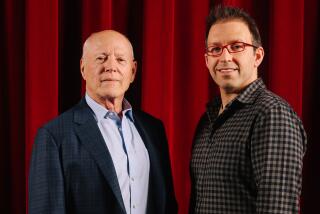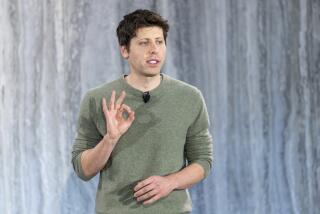Problems Mount at General Magic : Technology: Marketing chief quits and co-founder is taking leave of absence. Firm is also preparing a reorganization.
- Share via
SUNNYVALE, Calif. — General Magic Inc., one of the wealthiest and most widely touted start-ups in the technology world, said Thursday that its marketing chief is quitting and that a co-founder is taking a leave of absence--ominous developments for a company that has consistently failed to live up to its promises.
The company is also preparing a reorganization that will create separate units for each of its two products: a software operating system for hand-held computers, called Magic Cap, and an advanced computer communications language known as Telescript. Both products have been plagued by delays and disappointing performance.
General Magic’s problems, though in many ways not surprising, are a cautionary tale for investors and others who are eager to catch the next big wave in technology. For if any start-up company looked to be bred for success, it was General Magic.
By tradition, technology start-ups are born in a garage, but General Magic was born in a mansion. Co-founders Andrew Hertzfeld and William Atkinson were already industry legends when the company was launched five years ago, having written the basic software for the Apple Macintosh. Apple, AT&T;, Motorola, Sony and others have backed General Magic to the tune of $77 million, and a stock offering earlier this year raised another $82 million.
General Magic Chairman Marc Porat can be persuasive indeed as he paints a picture of a new type of computing and communications based on General Magic software.
Computers would be transformed from mere calculators or word processors into truly intelligent assistants: Owning a gadget with General Magic software would be like having a secretary in your pocket. General Magic would supply the software, its corporate investors would make and sell the computers.
Analysts gushed that General Magic had the potential to become the digital version of English, with everything from hand-held “personal digital assistants” to desktop PCs and even mainframe computers communicating via Telescript. Entire communications and information networks would be based on the technology, with the Telescript software able to scour networks on its own to retrieve information or conduct transactions.
But today, only Motorola and Sony are selling hand-held computers with the Magic Cap operating software, and both companies’ machines fall far short of being the pocket secretaries that Porat had promised. Telescript, meanwhile, is available only in a rudimentary early version that performs few of the promised functions, and few computers are equipped to understand it.
In effect, the company’s software speaks one language while the vast amounts of available digital information speak another.
“In order for General Magic to be successful, all the planets have to be aligned,” said John McCarthy, an industry analyst at Forrester Research in Cambridge, Mass. “All the content out there has to be able to understand General Magic. It becomes an all-or-nothing bet.”
Some of the difficulties can be traced to General Magic’s falling-out with Apple, the company that gave birth to many of the ideas behind the technology. Porat was former Apple Chief Executive John Sculley’s technology guru.
“Marc and John used to talk every morning,” said Sculley’s former publicist, Jane Anderson, who now works for Porat at General Magic. “John has always been interested in future stuff, and Marc is very good at articulating that kind of thing.”
It was Sculley who decided to set Porat up in business, persuading the blue-chip companies that Porat likes to call “the alliance” to invest.
But the relationship began to sour even before Sculley left Apple in 1993. At about the time General Magic was founded, Apple began work on the Newton, designed to be the first of a new breed of hand-held computers that Sculley dubbed personal digital assistants. General Magic was years away from finishing its software, and rather than wait, Apple decided to create its own. Suddenly, the two were competitors.
“There was real tension at the board level between Apple and General Magic,” Porat said. “John [Sculley] was trapped in an untenable position. If he supported us, it would be perceived that he was not acting in the best interests of Apple.
“Apple decided to crush us, but they didn’t succeed,” Porat said. “Their absence is tragic for them and for us.”
Today, Apple is focused on its core business, the Macintosh. Another General Magic partner, AT&T;, is struggling to make sense of a large, and overlapping, product line. Sony seems unlikely to do a follow-up to its General Magic-based computer, the Personal Link, a product considered a failure by its Japanese management.
For the quarter ended June 30, General Magic posted a loss of $6.5 million on sales of just $1.9 million.
“Our story is a long-term one,” Porat said. “It’s really hard to establish a whole new platform in computing.”
And the company’s job will be even tougher in the absence of marketing chief Joanna Hoffman and, especially, co-founder and chief scientist Atkinson.
Hoffman, 40, said she was leaving to spend more time with her family, though some speculated that she might have been on the short end of the upcoming reorganization.
Atkinson could not be reached for comment. But Anderson indicated that he was burned out after five frustrating years with the company and might not return at the end of his leave.
General Magic shares closed down 37.5 cents at $16.375 on Thursday.






